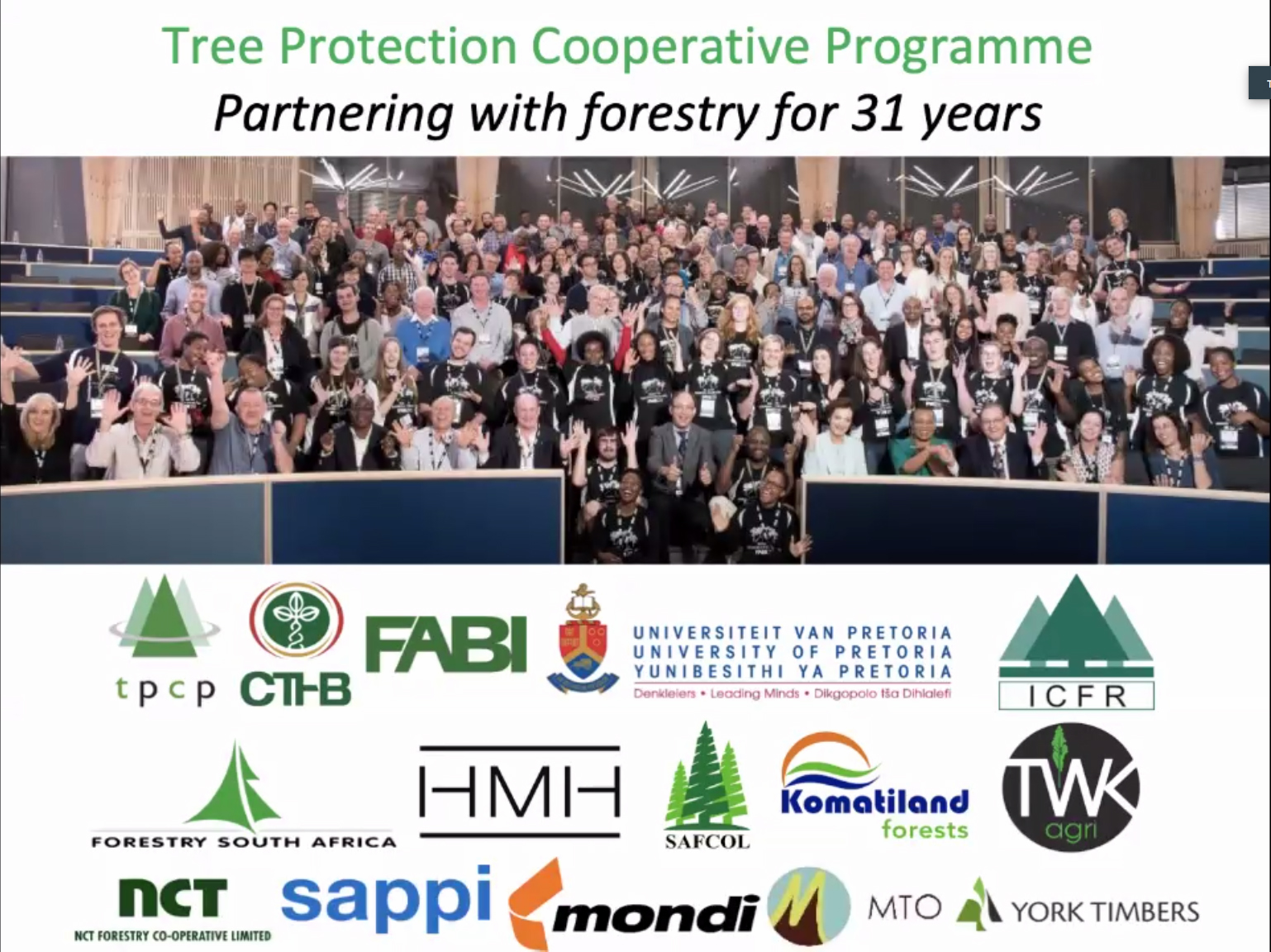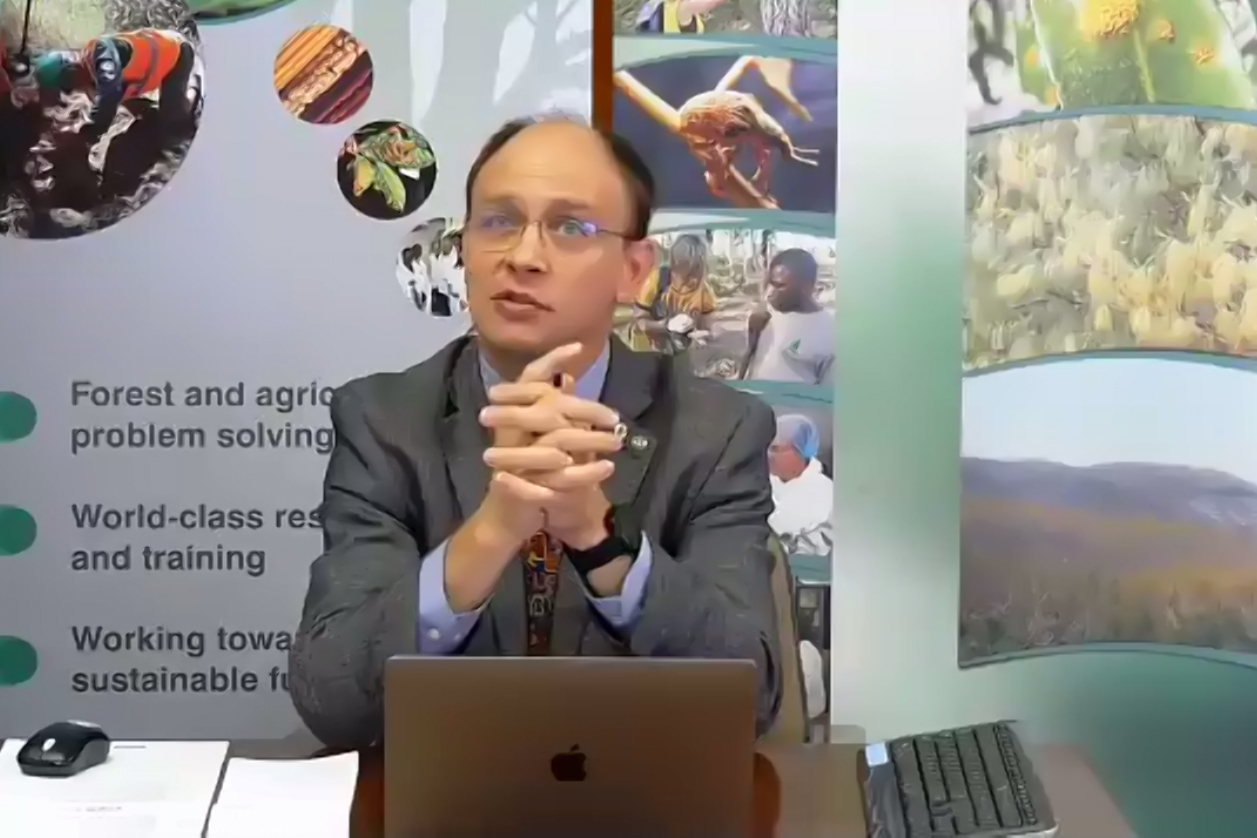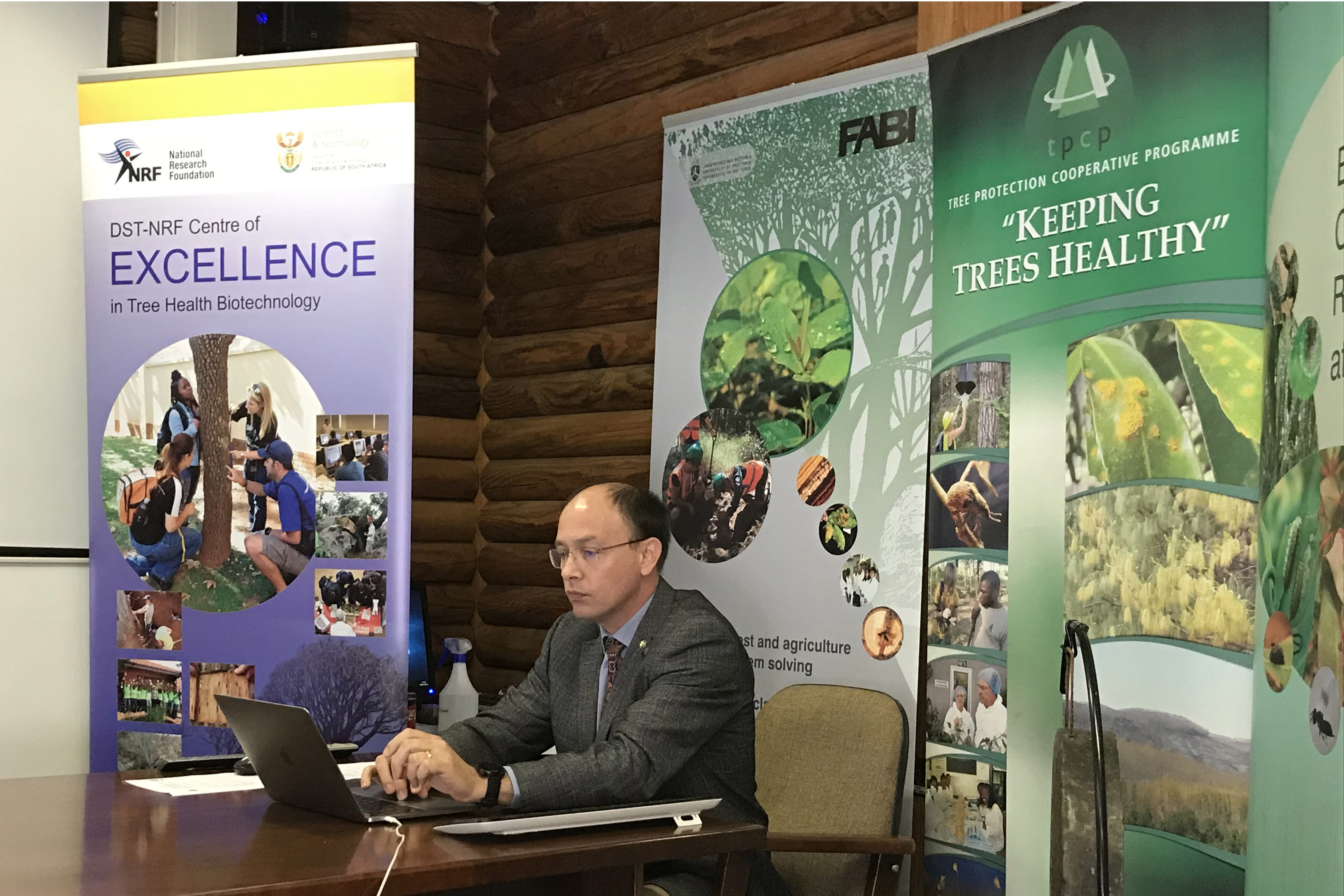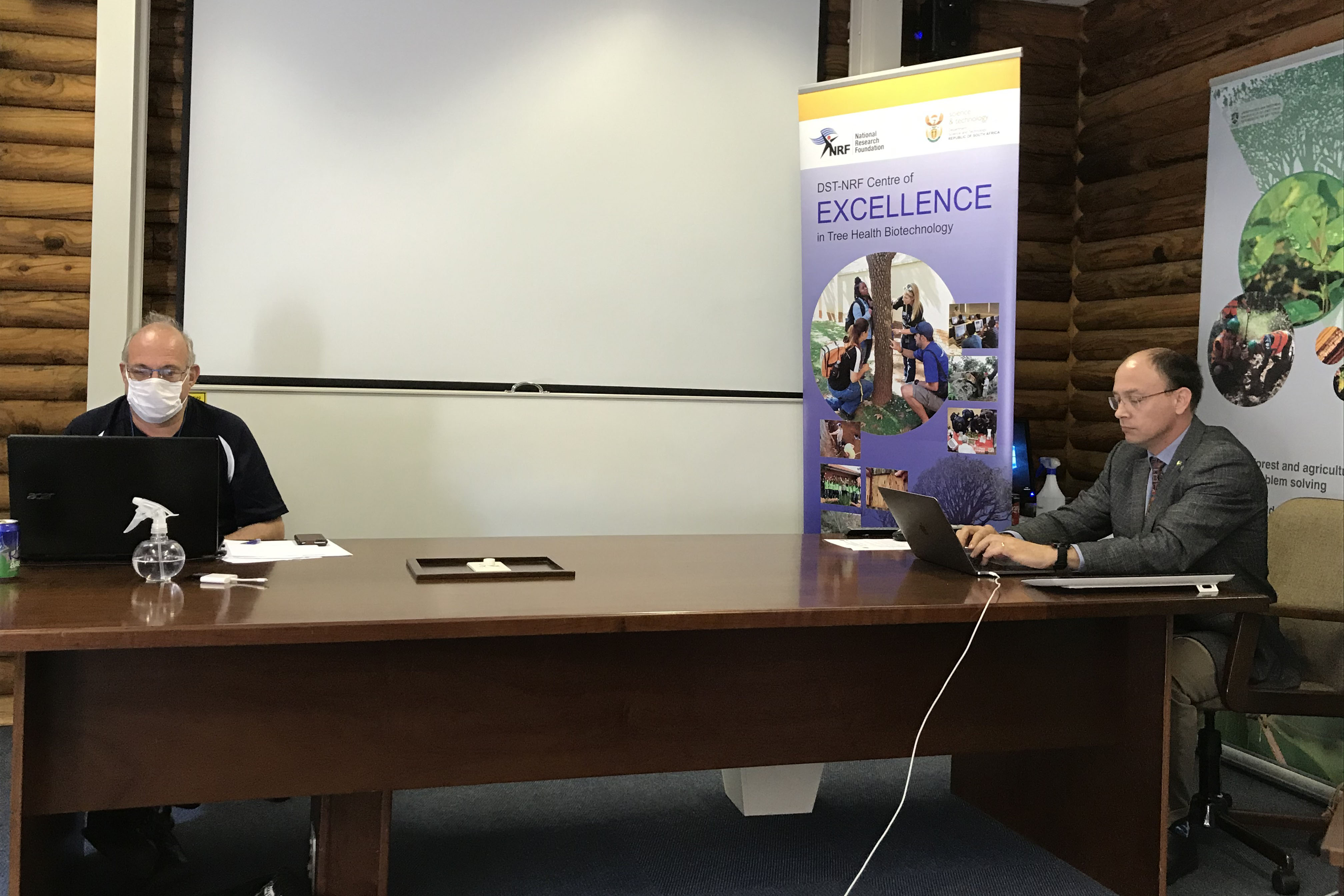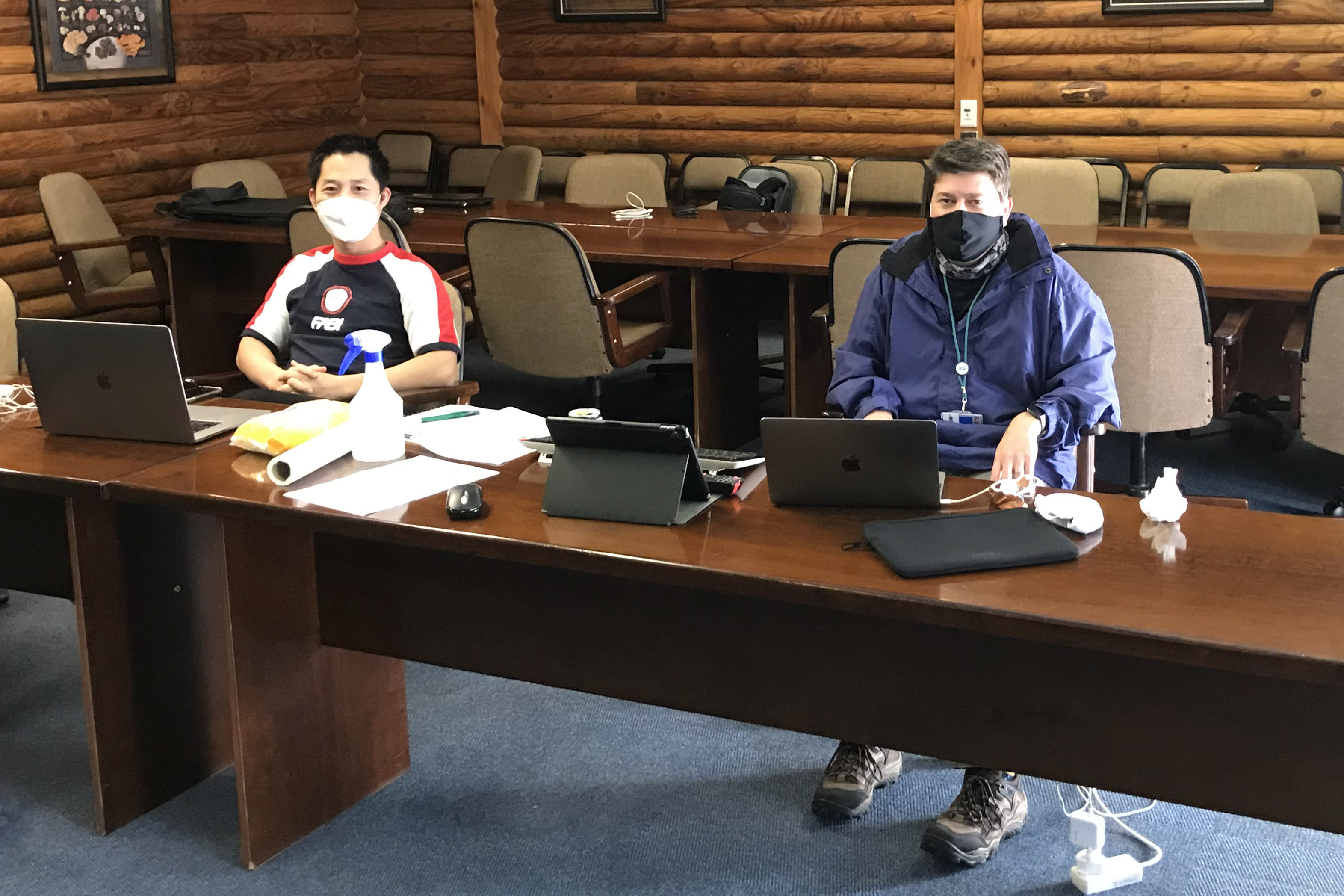FABI’s first ‘virtual’ symposium successfully connects academia-industry-government networks 2020-05-15
The 31st Annual meeting of the Tree Protection Co-Operative Programme (TPCP) and DSI-NRF Centre of Excellence in Plant Health Biotechnology (CPHB) in FABI was held on 12 May. The CoViD-19 pandemic lockdown restrictions meant that this annual event could not be held as normal, and a decision was made to host the meeting via the Internet. More than 250 participants from South Africa and 12 countries across four continents joined the meeting ‘broadcast’ concurrently using ZOOM and Microsoft TEAMS platforms. All participants were unanimous in their praise and agreement that the event was a resounding success. While the normal meeting usually extends over three days and would have been held at the University of Pretoria’s Future Africa campus, this this year’s event was condensed to a six-hour-long symposium. Delegates at this truly international event included FABI and UP researchers and students, as well as members of the UP leadership, industry partners and representative bodies, government departments (DTI, DEFF and DSI), research collaborators and academia.
The symposium was arranged in four sessions. These covered the themes consecutively (1) Industry-University partnerships in a post-CoViD-19 world; (2) Tree health in a changing world; (3) From basic research to application; and (4) Thirty-one years of impact; big data, biotechnology and the future of tree health management. These were interspersed with panel discussions including FABI researchers and stakeholders of the TPCP and CPHB.
The opening session discussions contemplated the state of partnerships between academia and industry. This as research programmes of the TPCP and CPHB gear up for a “new normal” in the aftermath of CoViD-19. Opening the symposium, FABI Director Prof. Bernard Slippers explained how the TPCP and the CPHB have relied on a synergy with each other over the years, as well as strategic partnerships with the University of Pretoria, stakeholders in the South African forestry industry and various government departments. Director of the CPHB Prof. Emma Steenkamp predicted in her welcome address that these partnerships would remain “crucial” in a post-CoViD-19 world.
The opening panel discussion was started by York Timbers CEO, Mr Piet van Zyl, who described the crucial role of Universities to provide a platform for ‘Coopetition’ between various role players across the complex landscape in which business operates, including other industries, diverse research expertise and government players. University of Pretoria Vice-Chancellor and Principal Prof. Tawana Kupe made the point that the level of support that a university enjoys from industry was a gauge of its “vibrancy”. He said a “well-nourished university needs sustenance from industry”. His prediction was that as the world transitions into a new economy post-CoViD-19 and as industries re-invent themselves, universities would be central to the creation of a “global store of knowledge”.
Climate change and invasive pests and pathogens are two undisputed challenges to commercial forestry worldwide. It brings with it changes, not only to the environment but also provides opportunities for insect pests and diseases to colonize new areas previously unsuitable for their survival. Prof. Emma Archer shared the view that multi-disciplinary and collaborative research partnerships between academia, industry and government, such as those found in FABI, will be essential to address this ‘new normal’. It was clear from comments and views of panelists that fundamental research in FABI had, over more than 30 years, laid the foundation for the application of management practices for new and established pests and pathogens of plantation-grown forest trees in South Africa.
An important message emerging from the presentations was that the rapid advances in biotechnology and ‘big-data’ processing will provide many new possibilities for future tree health management. In this regard, the TPCP and CPHB have long used genomics, transcriptomics, metabolomics and data science to guide control strategies in forest pest and disease management. As part of FABI’s international collaborations, the meeting was informed of a Satellite Laboratory in Applied Chemical Ecology and research programme which was launched in partnership with Natural Resources Canada (NRC) earlier this year. Professor Jeremy Allison of NRC shared his enthusiasm regarding this satellite lab and illustrated its many strengths.
Manager for Projects and Partnerships at Future Africa Dr Osmond Mlonyeni made the important point that the CoViD-19 pandemic had cast the relationship between academia, scientific research and industry in the limelight. He predicted that this period of uncertainty provided vivid opportunities to highlight partnerships that work well. The TPCP and CPHB illustrated such powerful partnerships.
Each of the four symposium themes included a presentation by an invited keynote speaker and a presentation by a TPCP/CPHB research leader. These were each followed by the panel discussions. Professor Slippers mediated these discussions drawing from the many questions that participants posted to the ‘chat box' facilities that form part of the virtual meeting software packages. In every case, there were many more questions than could be accommodated in the time available, illustrating a powerful capacity of such virtual meetings. While powerful human factor that underpins face to face meetings can never be fully replaced, it was obvious that a virtual meeting such as this one can where necessary, provide an alternative option. In the future we might see a hybrid option arising where people unable to travel will still have the opportunity to participate in important meetings such as this one of the TPCP and CPHB.
To view a video of the opening, click here.


